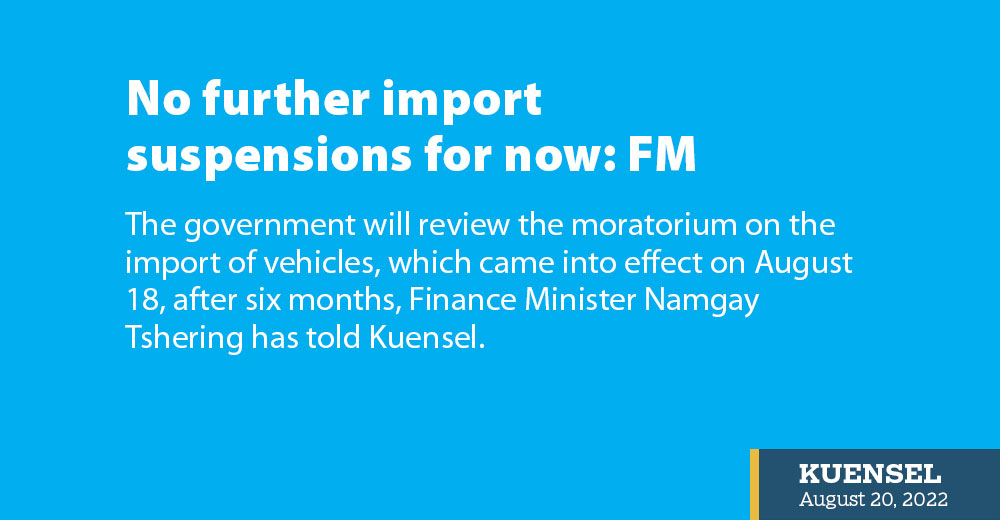MB Subba
The government will review the moratorium on the import of vehicles, which came into effect on August 18, after six months, Finance Minister Namgay Tshering has told Kuensel.
The moratorium was imposed in view of a drastic depletion of currency reserves and the worsening Balance of Payments, which is the difference between the inflow and outflow of money.
The reserve position and Balance of Payments, the finance minister said, would be reviewed on a monthly basis to keep track of the situation. He said the moratorium would be eased gradually depending on how the situation would improve.
Asked if the government had plans to restrict other non-essential imports, he said that a detailed plan of action and a list of goods whose imports would be restricted if the situation worsens have been prepared.
However, the finance minister added, “For now, we think that no further import suspensions are needed.”
According to Lyonpo Namgay Tshering, the suspension of the import of vehicles would reduce the outflow of both dollars and Indian rupees (INR). “The decision will also reduce the import of fuel (which also contributes to the depletion of INR).”
The import of vehicles is one of the main factors contributing to the depletion of the reserve. The country imported more than 8,000 vehicles from June 2021 to June 2022.
The foreign currency reserve currently stands at USD 845 million (USD and INR combined), which according to the central bank, is enough for the export of essential goods for nine months.
While the opposition leader did not respond to repeated calls, opposition MP Ugyen Wangdi said that he personally supported the government’s decision.
However, he added that the government should have restricted the import of certain non-essentials when the reserve had started to decline. “We could have managed the reserve in a better way,” he said.
The moratorium is expected to hurt the recovery of the economy that has been devastated by the Covid-19 pandemic.
An observer said, “Since the economy is import-driven, the moratorium will have significant implications on economic growth.”
He said that the foreign currency reserve had depleted because of the disruption of exports and lack of foreign currency earnings from the tourism sector. The sudden increase in imports after the normalisation of the Covid protocol worsened the situation, he added.
The value of imports during the first six months of 2022 exceeded that of the total imports of 2021 due to the normalisation of Covid-19 protocols, according to the finance minister.
After the tourism sector was closed with the detection of the first Covid-19 case on March 5, the country mainly depended on borrowings, grants and remittances to maintain the foreign currency reserve.
Some observers say that it would be challenging for the government to return to normalcy given the limited sources of foreign currency.
According to them, there are not enough grounds to be assured that the reserve issue would be solved in a short period, as exports have not been diversified adequately.
However, the finance minister said that the government would encourage and promote the use of local products to replace imports as much as possible.
Foreign currencies are required for meeting fiscal deficits, external trading with third countries, and even for the purchase of INR in case, the country faces a shortage of INR.


